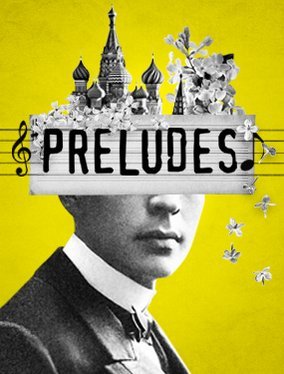I wanted to see Preludes at Lincoln Center Theater the minute I heard about it. A musical about Sergei Rachmaninoff's three-year writer's block brought on by the botched premiere of his first symphony, and the hypnotherapist who saved him? That's for me.
Where the arts are concerned, I have a fascination with the past that goes beyond curiosity. I want to live in it as deeply as I can, in order to experience it, as nearly as I can. I want to hear Louis Armstrong at the Roseland Ballroom with the Fletcher Henderson Orchestra in 1925. I want to see Nijinsky leap through that window onstage at the Théâtre de Monte Carlo in 1911 during the Ballet Russes premiere of Le Spectre de la Rose. Rachmaninoff's block? I want to taste it.
Preludes, I knew, was written by Dave Malloy, an iconoclastic composing polymath, who favors classic opera and musical theater style unapologetically shot through with electro pop grooves in a perfect storm of extreme anachronism. Malloy's big achievement thus far (in tandem with his director/collaborator Rachel Chavkin) has been Natasha, Pierre & The Great Comet of 1812, which took an episode from Tolstoy's War and Peace and brought it to a tent here in NYC's meatpacking district as an engrossing piece of site specific, techno dinner theater à la russe.
Theatrically, there are many ways to send an audience into the past; most of them tried and true. You can start at the end and reflect back to the beginning -- think Amadeus or Merrily We Roll Along. You can start at the beginning and announce: You are there! Think...well, all of Shakespeare's History Plays; in fact, pretty much everything he ever wrote. Tom Stoppard sometimes manages to share the past with us in simul-time; both past and present told back to front and front to back simultaneously, as he did so movingly in Arcadia.
Our age of endless self-reference and post-ironic knowingness has currently elevated extreme anachronism as the flavor enhancer of choice for savoring the past onstage. Where Stoppard delivers a split screen that alchemically blends into one vision, extreme anachronism is a more slapdash gambit that celebrates its own disjunction, best expressed in mismatched costumes -- period pantaloons topped by cropped-tees; or mismatched dialogue -- slang from disparate historic time zones all babbling at once. Something Rotten does this baldly and unashamedly and plays it for laughs. Plenty of other shows have done it with a straight face.
Personally, the whole business strikes me as a kind of theatrical FaceTime -- you're here and you're there; on the phone with the past, yet still sitting in your room, gazing at your electronic device as it gazes back at you.
Preludes, at LCT3's groovy cool rooftop Claire Tow Theater, proved a grab bag of extreme anachronism tossed around with a straight face, though the sardonic grin and even the smirk of a sophomoric collegian more than occasionally peeks through. Rachmaninoff himself is played by two actors in period costume: the very intense Gabriel Ebert as walking-talking-tortured-Rachmaninoff, and the virtuosic Or Matias at the piano, as alter-ego-Rachmaninoff-the-musician. Rachmaninoff's words and very presence are drawn with whiny modernism. Nikolai Vladimirovich Dahl, the male hypnotist who healed Rachmaninoff, is played by the female Eisa Davis garbed in the earthy layered linens of a Marin Country psychotherapist. Rachmaninoff's lover, Natalya, played by Nikki M. James, is very Nikki M. James now, and very little Natalya then. Conversely, a load of Rachmaninoff's fellow historical Russian celebrities -- Chekhov, Tolstoy, Glazunov, Tchaikovsky, Tsar Nicholas II (all portrayed by Chris Sarandon) -- are straight-up period Russians, though the legendary opera basso Chaliapin (dazzlingly sung by Joseph Keckler) traverses a willfully blurred line between past and present.
The music is gorgeous, for two simple reasons: Much of it is Rachmaninoff's, and Mr. Matias plays it magnificently. Mr. Malloy's musical contributions weave in and out of Rachmaninoff's with harmonic illuminations that are often riveting, underscored by a finely-grained rhythmic emotional undertow of electronic beats from an orchestra of duo synthesizers.
The whole thing made me dizzy, which was no doubt the creators' objective; the piece is, after all, self-described as "a musical fantasia set in the hypnotized mind of Russian composer Sergei Rachmaninoff." It is also made me sleepy. I loved the aesthetic chances taken and the refusal to limit Preludes (why such a dull title?) to the tried and true in terms of theatrical history-telling. Still, I left unsatisfied. Not for a moment did I feel that I'd come any closer to Rachmaninoff in his own moment. Which, I guess, may also have been the point. At this late date, who can? Or rather, can we ever? Damn it.

